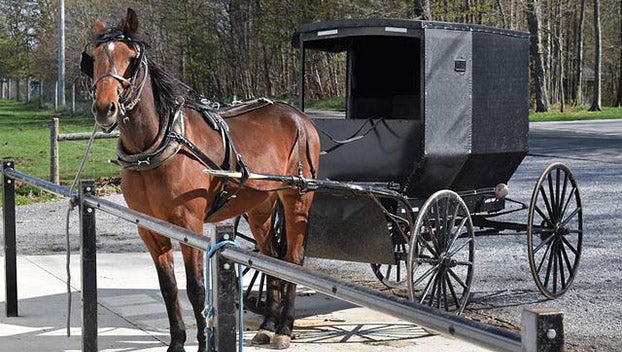Learning To Speak Up At The Capital
Published 4:50 pm Tuesday, February 12, 2013
This is the story of how I found myself jay-walking across a windy Richmond street with Attorney General Kenneth T. Cuccinelli on the last day of January.
But, first let me explain why and how I got there. While attending board of supervisors and school board meetings over the month of January, I have been struck by a sense of powerlessness as discussions of budgets and state legislation arose. Two quotes in particular stood out to me:
“We're the poor little runts at the trough getting what the urban areas leave for us,” said Chairman David Meinhard, District Four, during January's Cumberland Board of Supervisors meeting, while mentioning his fear that rural localities were becoming irrelevant.
Second, during a budget work session last month School Board member Dr. Christine Ross, District Five, expressed frustration regarding state funding, adding that she had been told the Governor has put a lot of money into a rainy day fund. She felt that whether he realizes it or not the “sixty-eight percent of his counties that are rural are in the rainy day. We don't need him putting any more in his little rainy day fund for when a rainy day comes. It's pouring on us.”
Whatever your position on particular pieces of legislation or school funding, it is hard to ignore the overarching sense of not being heard or understood that was evoked in both of these quotes.
The problem of being heard and represented is not a new one in the United States. In fact, gaining voice is a key issue, one that helped spark our nation's founding. Far-flung communities like Cumberland grew tired of sending monies and having to answer to a distant government that didn't seem to understand their needs.
Earlier last month, when I heard that Local Government Day was fast approaching, I decided to shadow some local leaders as they headed to Richmond. The event is sponsored by the Virginia Association of Counties (VACo) and centered around making local leaders aware of legislative issues affecting them and providing an opportunity to lobby their delegates.
Richmond isn't far away. At least not as far away as England. I go shopping there at least twice a month. There didn't seem to be much of an excuse for neighboring officials or myself not to be visiting state representatives, since it was only an hour's drive. Thankfully, the delegation from Buckingham – including Buckingham County Supervisor Cassandra Stish, District Five, County Administrator Rebecca Carter and Assistant County Administrator Karl Carter – let me tag along as they visited Delegate Matt C. Fariss and Senator Thomas A. Garrett Jr.
As I prepared for my visit, more opportunities arose and included a possible opportunity to also speak with Terry McAuliffe and Attorney General Cuccinelli, the two announced gubernatorial candidates, both of whom were speakers at the VACo event. Not only would I be able to see local leaders exercise their voice, I would also be able to ask two gubernatorial hopefuls about their thoughts regarding the voice of rural localities in Virginia. (See accompanying article.)
Perhaps Buckingham was eager for me to follow them because they were well prepared, having secured appointments with both delegates in advance. Stish arrived with a printed list of particular legislations to discuss with her representatives, with lots of notes scribbled in the margins.
Unfortunately, finding government officials in the first place was a little trickier than it seemed. At one point, despite the friendly children's artwork hung on the walls, the ever turning hallways and lack of windows in the General Assembly Building reminded one of our members of a rabbit warren. It was unclear whether we were the rabbits or if our representatives were.
And once the offices were located, it was at times uncertain whether we would be able to speak to our representatives. While Fariss was available after finishing up a phone call, at first it seemed like we wouldn't be able to speak to Garrett at all. We were informed he had a committee meeting and were ushered into his office to speak with a legislative assistant.
However, Garrett appeared soon after, the subcommittee meeting location somehow called into question, and was able to speak with the delegation.
Our little contingent wasn't the only ones with a list. The evidence of other lobbying voices was apparent throughout our meetings with both Fariss and Garrett. A message about fox penning was left for Fariss, a list of legislative requests from a school-related lobbying group was on Garrett's coffee table and he received a note from Farm Bureau during the conversation.
Despite Stish's well-planned list, she was trying to speak over organizations that had folks working full-time just to track the status of these bills. Organizations that could send out quick updates and last minute cries of attention at a moments notice.
As I saw the sheer volume of information and lobbying force that was pouring into these offices Buckingham, Prince Edward and Cumberland suddenly seemed an ocean away from Richmond. How were we ever going to compete?
Fariss listened attentively, even pulling out his iPad to verify specific bill numbers and ensure he was on the same page.
Garrett explained votes, commiserated over mandated spending and asking for a follow up email of specific legislative concerns.
As we left Garrett's office, I told Garrett about Meinhard's quote, asking him what he thought localities could do to make their voices heard. His answer, “It is literally the squeaky wheel gets the grease.”
And, amidst the hustle and bustle of the General Assembly, this seems to be true.
At least, it was true for me.
Because, we certainly wouldn't have had the accompanying story on the gubernatorial candidates' thoughts on rural localities, if I hadn't been a little squeaky myself.
You see, McAuliffe was easy to track down and interview. He was campaigning. He arrived early to speak. We spoke for a few moments outside the meeting room, exchanging pleasantries. He was able to answer my questions in a relaxed fashion.
Cuccinelli was scheduled to speak later in the program. He was late. Before he arrived, the area began to fill with others who came just to hear him speak. The room became crowded
There was no chance of me cornering him before his speech and during the speech it became very clear that my chances of interviewing him afterward were just as shaky. He apologized for not being able to stay longer. He was late already for the governor's task force organized after the Sandy Hook tragedy.
What could have only been another reporter, or, dare I say “journalist,” was casually leaning against the conference-room wall near my seat.
As I navigated the room to take pictures while Cuccinelli spoke, he lazily wrote in a small note pad, held in the same hand as his recorder. Whatever the truth may be, he looked like he had been doing it all his life. He really should have had a cigarette dangling from his lips. Newbie that I was, I couldn't manage such feats of dexterity, opting to leave my recorder running at my seat as I took pictures.
And suddenly I realized that I was going to have to go head-to-head against this old-hand reporter. I felt it in my gut. He didn't care about Local Government Day. He wanted to talk to Cuccinelli about something else. Here I had been diligently covering the entire event and he pops up at the very end and expects to swoop in and take my interview.
And, he almost did. As mayors, supervisors and county administrators clapped, Cuccinelli stepped down from the stage. I had already put the lens cap on my camera and was hurriedly stuffing my legal sized notepad into my oversized purse when the Attorney General rounded the corner and headed for the door. He was going to be next to the old-hand reporter in a minute and I had to make my move.
Location isn't everything. Sometimes sound can make a difference.
“Ilsa Loeser, Farmville Herald,” I blurted out, offering my hand while still four feet away, just as the old-hand reporter went to open his mouth.
I was the squeaky wheel. Cuccinelli looked my way first.
“I know you're in a hurry. Can I walk with you and ask you two questions?” I asked as he hurriedly shook my hand and continued to the door.
And maybe it was the fact that I had contacted his scheduler the previous day. Or maybe it was that he knew this guy and knew he wouldn't want to answer his questions. Or maybe it was just that I was the one that spoke first. But, for some unknown reason, he answered my questions.
So we walked fast and I stood close, holding my recorder high. As we rode the escalator, I had a slight moment of panic after noticing the earpiece of the man leading our way. I realized, although I may have been quoting Meinhard, I wasn't in Cumberland anymore.
All the while, the old-hand reporter was standing on the other side of Cuccinelli, like a vulture, recorder in hand.
I was able to get my two questions out and Cuccinelli was able to give substantial answers, just finishing the interview as he ducked his head into his car.
As I walked away, I could see the old-hand bent down, recorder thrust toward the closing car door. Who knows what he asked. Surely it was more interesting to the majority of the world than my two questions which quoted Cumberland residents and focused on the care and keeping of rural localities in an increasingly competitive and urban environment.
But, that is what I cover and that is what I cared about and that is what the people in my county care about and that is what I wanted to ask.
I was squeaky. I got it out, new as I was to it all.
May our counties and towns be the same. May we use the voices that God has given us in a nation that, thank heavens, is based on a representation, to speak to our delegates so that they can truly represent us. Because, certainly plenty of others are clambering to catch their ear.
We can't complain that we are losing our voice, if, being intimidate by the size, technology, experience, resource and skills of other localities, we just keep our mouths shut.
How can our representatives know what we need and want if we do not ask? And how do we ask without speaking?
The doors to the Capitol building feature the front and back of the Seal of Virginia. On the back of our state seal is an image of three women, roman goddesses representing liberty, eternity and agriculture. The Latin word “Perseverando” spans over them.
As citizens of rural counties, may we indeed persevere, find our voice to speak and, if need be, act. Because, as peaceful as the three look, we cannot forget the front: an image of empowerment and reminder of our state's proud heritage of fighting for our voice to be heard.
My hope is that our localities and our citizens will be diligent in researching and finding ways to be heard. It may be the old fashioned use of telephone calls and face-to-face meetings. Or, maybe, we can even muster up a few emails.





